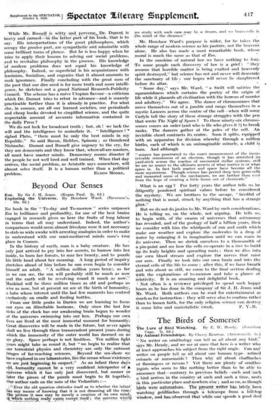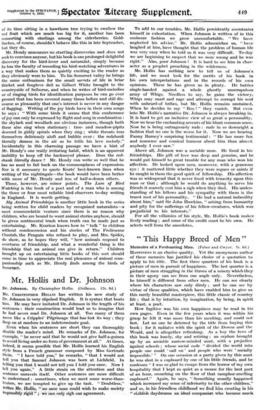The Birds of - Soniets6t
•
My Animal Friendships. By Cherry Kearton. (Arrowsmith. 3S.,) No writer on ornithology can tell us all about any bird,' says Mr: Heady, and we see at once that here is a writer who at least approaches his subject from the right angle. Can an Writer on people tell us all about one human type—retired colonels or nursemaids ? Then why all about chaffinchee or flamingoes or ravens ? Yet there are plenty of ornitho- logists who seem to like- nothing better than to be able to announce that---2-contrary ,te previous beliefs--such and -Such al-bird arrives in the country at such and such a tithe; nests iii this particular place and nowhere else ; and so on, as though birds were automatons. The present_ writer has.,.lately,been watching goldfinches through a telescope from a hill-top 4r4ndow, and has:observed that-while one' Wends n good deal of its time sitting in a hawthorn tree trying to swallow the red fruit which are much too big for it, another has been consorting with starlings among the elderberries. Gold- fmches, of course, shouldn't behave like this in late September, but they do.
Mr. Hendy announces no startling discoveries and ,does not seek to convince anyone, but his book is one prolonged delightful discovery for the bird-lover and naturaliit, simply because he has the faculty of recording his bird-watching adventures in a way that makes them as quietly exciting to the reader as they obviously were to him. To his Somerset valley he brings the same enthusiasm for the small secrets of life in briar thicket and foxglove dell as Gilbert White brought to the countryside of Selborne, and when he writes of bird-melodies or of ringing birds for identification purposes he can go over ground that has been covered many times before and still dis- course so pleasantly that one's interest is never in any danger of flagging. Writing of the joy birds have in their own songs he says : " With some birds it seems that this exuberance of joy can only be expressed by flight and song in combination : the skylark and woodlark are obvious instances, though both these also sing when stationary : tree- and meadow-pipits descend in giddy spirals when they sing ; white throats toss themselves deliriously aloft, and bubble over : the redshank literally dances in the air as he trills his love melody." Incidentally in this charming passage we have a hint. of Mr. Hendy's one really irritating habit, which is an apparent inability to keep off the hackneyed phrase. Does the red- shank literally dance ? Mr. Hendy can write so well that he has no need to fall back on the commonplaces of expression. Nor is it necessary to quote Keats' best-known lines when writing of the nightingale—the book would have been better with more of Mr. Hendy and less of half-a-dozen others.
These, however, are minor points. The Lure of Bird Watching is the book of a poet and of a man who is among the three or four most reliable bird observers to-day writing
in' England, It is worth getting., - -
My Animal Friendships is another little book in the series being written for child readers by recognized naturalists--a most commendable venture since there is no reason why children, who are bound to want animal stories anyhow, should be given sentimental trash when truth can be made just as entertaining. Mr. Kearton knows how to " talk " to children without condescension and his stories of The Frolicsome Cheetah, the Penguin who refused to play, and Mrs. Spider, do show, as he hopes they will, " how animals respond to overtures of friendship, and what a wonderful thing is the friendship that an animal can give in return." Children brought up on entertaining little books of this sort should come in time to appreciate the real pleasures of animal com- panionship such as Mr. Hendy finds among the birds of Somerset.























































 Previous page
Previous page